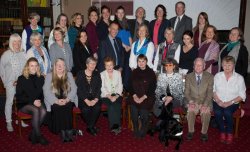New Lucy McDiarmid Book: At Home in the Revolution
Posted in: Faculty News

Posted December 2015
Lucy McDiarmid, Marie Frazee-Baldassare Professor of English, is commemorating 100 years since the Irish revolution with her new book At Home in the Revolution: What Women Said and Did in 1916, published by the Royal Irish Academy.
In November, she travelled to Ireland to meet and present a copy of the book to the nation’s president, Michael D. Higgins (pictured above). She also spoke at the Dublin Book Festival and sat on a panel discussion for the book launch. Available as a podcast on SoundCloud, the engaging discussion with multiple experts gives the book academic context in terms of Irish historiography. In addition, she was interviewed for several radio broadcasts and a television documentary to be screened on Easter Monday, 2016, the 100th anniversary of the day the 1916 Easter Rising began.
Five years in the making, At Home in the Revolution derives its material from women’s accounts of the famous Easter Rising and offers an alternate history of the event.
The eyewitness narratives come from a variety of women on all sides of the conflict. McDiarmid found sources in diaries, letters, memoirs, autobiographies, and records in the witness statements of the Bureau of Military History. In addition, she used materials online such as the 1911 census for Ireland. McDiarmid has been giving talks on the subject for several years, so Irish people also reached out and shared diaries and letters from their ancestors. Many of the descendants even came to celebrate the book’s launch in Dublin (pictured right).

Untold stories
McDiarmid doesn’t focus only on the famous women of this time. Instead, she looked for accounts by anyone who told a good story, and many of these were working-class women who had not come to the attention of scholars before.
The rich, new testimony in all these materials emphasizes episodes often ignored or considered trivial by traditional scholars, such as cooking with bayonets, arguing with priests, or resisting sexual harassment. The book’s analysis shows social change in process, with a focus on the way issues of gender were negotiated in a time of revolution. The book highlights episodes that capture a period when gender roles were uncertain.
“It’s a ground breaking study,” said historian Margaret Margaret Mac Curtain at the book launch.
Why write this book?
More on the book:
- At Home in the Revolution on the Royal Irish Academy Website
- Contact Montclair State Media Relations
- Podcast: Panel Discussion with Catriona Crowe with Margaret O’Callaghan, Margaret MacCurtain and author Lucy McDiarmid
- Trinity College Dublin post by McDiarmid on a valuable hand-written diary
The book is an outgrowth of McDiarmid’s years of teaching the poetry of W. B. Yeats as well as her earlier book on Irish cultural controversies of the pre-Rising period. It was also inspired by Kathleen Clarke’s autobiography Revolutionary Woman, which McDiarmid assigns as part of her class on the Irish Revival (1890-1939). She assigns this book “so my students can encounter a contemporary of Yeats and Joyce who never mentions either one of them, someone for whom Irish independence, not literature, is the supreme value,” she said.
In Clarke’s account and others by women, McDiarmid saw memorable episodes and domestic details that stood out and seemed worthy of academic study. “I realized that there was a lot to be learned from those ‘small behaviors,’ as the sociologist Erving Goffman calls them, and they form the primary material of my book,” she said.
What’s next?
Lucy McDiarmid is currently on sabbatical working on her next book. It’s focused on contemporary Irish poetry and features many of the poets that she’s brought to Montclair State as part of a poetry reading series she established. “I’ve taught their poetry, they’ve given readings here, my students have met them, and I’ve had long conversations with them. That’s a wonderful background for writing a book about their work,” she said.
More coverage and events for At Home in the Revolution
- Irish Times: Review by Angela Bourke
- The Irish Times Weekend Review
- Novelist Lia Mills writing about the book launch
- The History Show on RTÉ Radio
- Century Ireland: Women of the Revolution: Untold Stories
- Irish America Magazine: “1916 – 2016: Proclaiming the American Story” by Turlough McConnell
The Irish Echo: “A new look at women of 1916” by Peter McDermott - Lecture: March 1, 2016 at the Consulate General of Ireland, New York: Watch the event on YouTube
- Lecture: March 12, 2016 at Kilkenny Castle, Kilkenny, Ireland
- Interview March 14 with Patricia Coughlan, Professor of English at University College Cork, at Farmgate Cafe in Cork, Ireland. Watch a video of the interview.
- Lecture: March 22, 2016 at National University of Ireland Galway. Watch a video of the lecture. McDiarmid’s speech begins at the time code: 7:50.
- Lecture: March 28: “Dublin, Easter 1916: What Was It Like?” at Trinity College Dublin
- Lecture April 2: Taste of the Yeats Summer School at the Glucksman Ireland House NYU
- Lecture April 21: Independent Spirit: America and the 1916 Easter Rising symposium with the Glucksman Ireland House NYU
- Lecture April 24: ‘Welcoming Ireland’ Cultural Celebration sponsored by the Consulate General of Ireland in New York and other community organizations
Selected reviews of Poets & the Peacock Dinner (Professor McDiarmid’s previous book)
The New Yorker
The Irish Independent
The Irish Times
Times Higher Education Supplement
